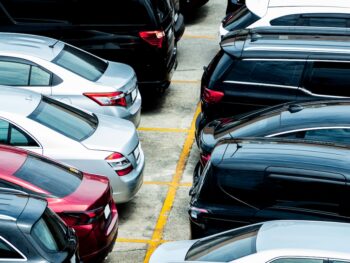Bigger cars not going to get bigger parking spaces, say councils
Councils are not planning to supersize parking spaces despite a trend for ‘autobesity’ among today’s cars.

Fewer than one in 10 UK councils plan to increase the size of parking bays despite the trend for bigger cars
Fewer than one in 10 UK councils plan to increase the size of parking bays, despite the fact seven of the top 10 most popular brands now sell cars that exceed the standard length of spaces, according to Autocar.
The data from its Freedom of Information request indicates drivers of larger cars will find it increasingly hard to park their car without risking punishment if the current trend of growing car dimensions continues.
Autocar compared the lengths of a sample of 27 cars sold in the UK to see how the sizes of some of the UK’s most popular models have changed since 2018.
It found they had increased in length by an average of 97.6mm (3.8 inches) – but the Peugeot 208 is nearly 580mm (22.8in) longer than it was in 2018. The BMW 7 Series has grown nearly a foot longer, meaning it is too long for the vast majority of parking spaces in the UK.
Standard off-street parking bays measure 2.40 metres wide by 4.80 metres long, and seven out of the top 10 best-selling car brands in the UK last year produce cars that exceed this length.
Five UK councils already impose maximum length restrictions on vehicles, putting the drivers of many big-selling models at risk of receiving fines when using council-run facilities.
Of the 287 councils that responded to Autocar’s request, 1.7% expressly ban cars exceeding a specific length, ranging from as little as 5.00 metres up to 5.35 metres. That means models including the Tesla Model X, Mercedes S-Class and Range Rover are unparkable in council run facilities in Wokingham, South Hams, and Broadland and South Norfolk.
Autocar found that councils have issued more than 357,000 penalty charge notices (PCNs) for cars parked outside marked bays since 2018, raking in more than £8m over this period.
Transport & Environment (T&E) warned earlier this year that new cars are getting too wide for British roads while “spilling out of” on-street parking spaces due to their increasing girth.
Research by the eco campaign group found more than half of new cars sold in 2023 were too wide for the minimum specified on-street parking space (180cm) in major UK cities.
The average width of new cars expanded to 180.3cm (71.0 inches) in the first half of 2023, up from 177.8cm in 2018 (70 inches), the T&E research found. On average cars were revealed to be getting 1cm wider every two years.
As well as bringing parking issues, the trend towards wider vehicles is reducing the road space available for other vehicles and cyclists while parked cars are further encroaching on footpaths.
Table 1: Autocar data on councils with maximum vehicle length restrictions
| Council | Maximum car length |
| Thurrock | 5350mm |
| Wokingham | 5000mm |
| South Hams | 5000mm |
| Broadland and South Norfolk | 5000mm |
| West Devon | 5000mm |
Table 2: Biggest growing models in the sample tested by Autocar since 2018
| Make/Model | Length in 2018 (mm) | Length today (mm) | Increase (mm) | |
| 1 | Peugeot 208 | 3475 | 4055 | +580 |
| 2 | Toyota Yaris | 3495 | 3940 | +445 |
| 3 | Mazda 3 | 4060 | 4460 | +400 |
| 4 | BMW 7 Series | 5098 | 5391 | +293 |
| 5 | Mercedes A-Class | 4299 | 4419 | +120 |
| 6 | BMW 2 Series | 4432 | 4537 | +105 |
| 7 | Peugeot 3008 | 4447 | 4542 | +95 |
| 8 | Mercedes C-Class | 4686 | 4751 | +65 |
| 9 | Toyota Prius | 4540 | 4599 | +59 |
| =10 | Range Rover | 4999 | 5052 | +53 |
| =10 | Volkswagen Tiguan | 4486 | 4539 | +53 |













Leave a comment